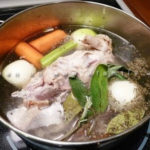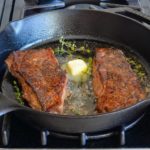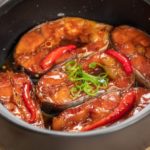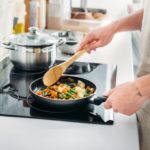If you’re a home cook, you’ve probably heard the term “searing.” Let’s explore this cooking technique in detail in today’s article!
1 What is Searing?
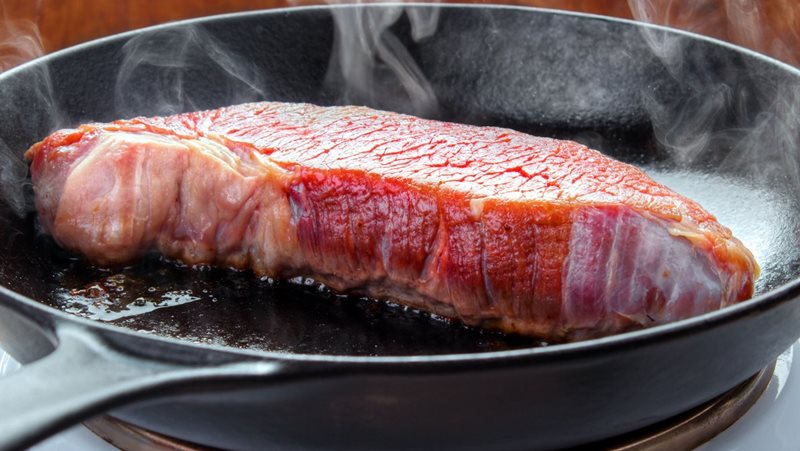 What is Searing?
What is Searing?
Searing is a cooking technique, also known as “sear,” that involves using oil or fat to cook food in a hot pan over high heat for a short period. The mechanism of searing involves transferring heat through the pan’s base via a layer of oil or fat to cook the food.
This technique helps retain the texture, moisture, natural flavor, and nutritional value of the food.
Typically, searing is used for cooking tender and moist meats such as pork, chicken, duck, beef fillet, and even some types of fish or seafood.
2 How to Sear Food Perfectly
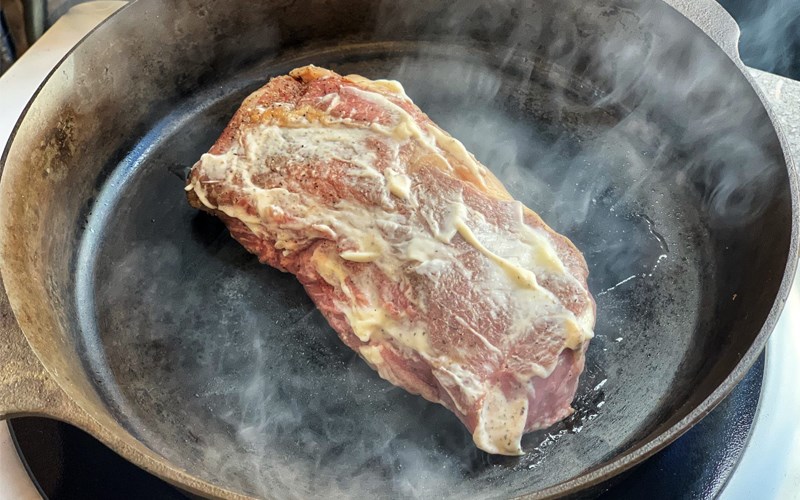 How to Sear Food Perfectly
How to Sear Food Perfectly
To cook delicious seared dishes, pay attention to the following factors:
Choose the Right Pan
For searing, use a heat-retaining pan made of aluminum or copper. These materials ensure even and thorough cooking. Additionally, opt for a non-stick pan made of stainless steel to prevent chemical reactions with acidic food components. Non-stick pans are also easier to clean.
Temperature and Searing Time
Adjust the temperature and searing time according to the type of food. Getting this right will ensure perfectly cooked food with a moist and natural texture.
Choose Seasonings and Sauces
Typically, seared dishes are served with various seasonings or sauces. Use only dry spices or pure salt to season the food before searing to maintain its pure flavor. Common sauces include wine sauce or fruit-based sauces like orange or passion fruit.
Choose the Right Cooking Oil
When searing, opt for oils with high smoke points such as peanut, grape seed, almond, or olive oil to preserve the dish’s flavor.
3 Tips for Successful Searing
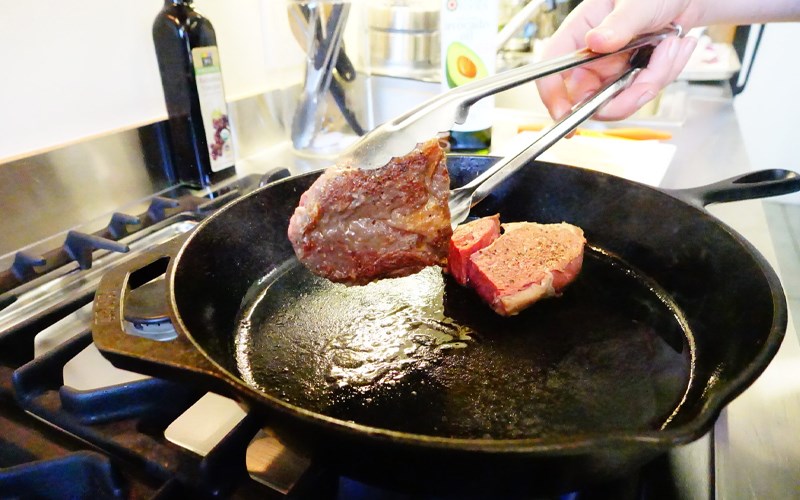 Tips for Successful Searing
Tips for Successful Searing
Keep these points in mind for tastier seared dishes:
- Avoid using butter for searing as it may burn.
- Don’t use a small pan for searing multiple pieces of food at once, as it won’t retain the heat, resulting in uneven cooking.
- Once the pan is hot enough, quickly add a layer of oil and the food to prevent overheating and burning.
- Let the seared food rest on a rack for 1-2 minutes after cooking. This allows the surface to tighten, and the moisture inside to distribute evenly, making the dish more appealing and juicier.
4 Professional Searing Techniques
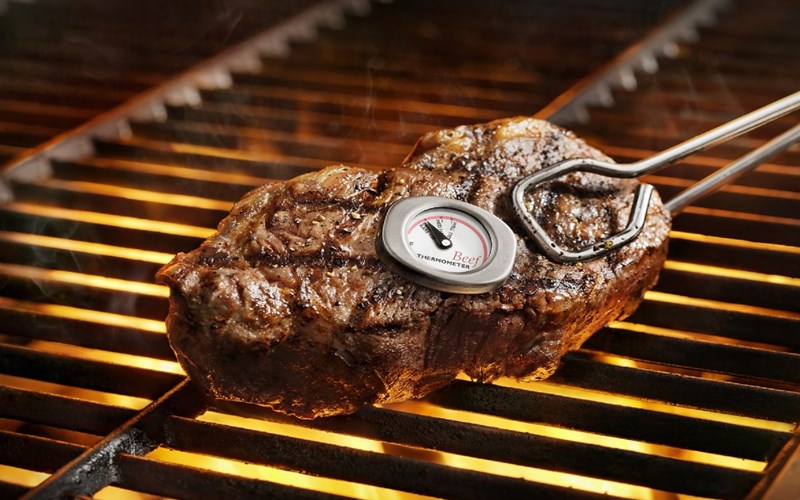 Professional Searing Techniques
Professional Searing Techniques
Pay Attention to Food Thickness
When searing, cut the food to the appropriate thickness according to your desired doneness. For a well-done steak, cut it to 1.5-2 cm, and for a rare steak, go for 3-5 cm.
Focus on Seasonings
When searing, only season the food with salt and ground pepper to maintain its natural flavor. Avoid using other seasonings or marinades.
Pan Temperature
Adjusting the pan temperature is crucial for a beautiful sear and moist food. Before adding oil, test the pan’s heat by sprinkling a few drops of water. If the water sizzles and evaporates, the pan is ready. If the water droplets dance and splatter, the pan is too hot, and you need to let it cool down a bit.
Let the Food Rest
After searing, let the food rest for about 2 minutes before serving. This simple step enhances the flavor and makes the dish more juicy and delicious.
5 Common Searing Dishes
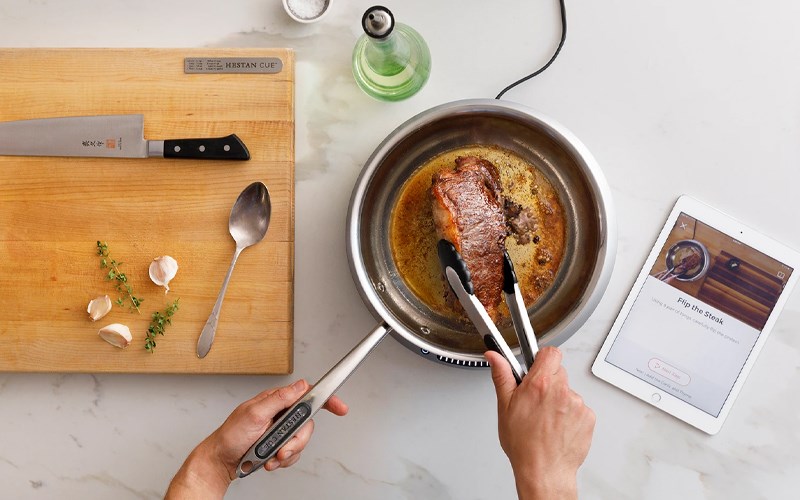 Common Searing Dishes
Common Searing Dishes
Seared Salmon
Salmon is a popular choice for searing. This technique gives salmon a crispy exterior while keeping the inside soft and buttery. It’s a simple dish you can easily prepare at home without complicated steps.
Seared Chicken Breasts
Seared chicken breasts have a delightful aroma and a crispy exterior with a juicy interior. Pair it with bechamel sauce to take the flavors to the next level and tantalize your taste buds.
Seared Beef
Beef is a must-mention when it comes to searing. Seared beef is juicy, fragrant, and mouthwateringly delicious. You’ll enjoy the combination of tender meat, seasonings, and sauces.
That’s all the information we’ve gathered about the searing technique. We hope you found this article helpful and that it inspires you to experiment with new cooking techniques in your kitchen!
Master the Art of Cooking: Unlocking the Secrets of Shocking Heat for Every Dish
Sous vide is a method of cooking food that involves vacuum-sealing it in a plastic pouch and then cooking it in a water bath at a precisely controlled temperature. This method of cooking results in food that is evenly cooked, tender, and juicy. It is also a great way to preserve food, as it can be stored in the refrigerator for up to two weeks or in the freezer for up to six months.
























